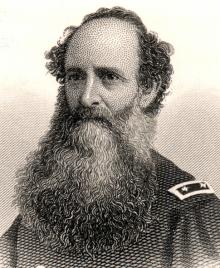- Home
- Archival Material
- College History Projects
- Subject-Based Digital Projects
Thomas Jefferson Jordan (1821-1895)

Birth: December 3, 1821; Walnut Hill, Dauphin County, Pennsylvania
Death: April 3, 1895 (age 73); Philadelphia, Pennsylvania
Military Service: USA, 1861-65
Unit: 9th Pennsylvania Cavalry "Lochiel Cavalry," 92nd U.S. Volunteer Cavalry, 3rd Cavalry Division
Alma Mater: Dickinson College, Law Degree (Class of 1842)
Thomas Jefferson Jordan was born at the family home of Walnut Hill in Dauphin County, Pennsylvania the son of Benjamin and Margaret Crouch Jordan. His father had been a county commissioner and was to go to be a state representative and state senator. The son attended local schools and later, in December, 1839, enrolled in the Law Department at Dickinson College in Carlisle, Pennsylvania, then under the leadership of its founder, Judge John Reed. He was enrolled at the College for the following two years and in February, 1843 was called to the Dauphin County bar in Harrisburg and opened a practice.
He practiced law and ran a lumber business in Harrisburg until the Civil War broke out. He immediately took a commission as aide to Major-General William Hugh Keim. Keim was raising volunteers in Pennsylvania and subsequently commanded a brigade in the Shenandoah Valley. With Keim, Jordan first saw action at Falling Waters in early July 1861. During the summer that followed, he was promoted to Major and ordered to assist in the recruiting and organization of a cavalry unit that became the 9th Pennsylvania Cavalry in October 1861. Known as the "Lochiel Cavalry," it had also the designation of 92nd U.S. Volunteer Cavalry. The unit was deployed to the Cumberland Valley with Major Jordan as the commander of its Third Battalion and saw action in Kentucky and Tennessee in early 1862. At Tompkinsville, Kentucky, on July 9, 1862, a superior force of Confederate raiders surprised Jordan and three companies of the Third Battalion. Jordan organized a fighting retreat but elements of the rearguard and Jordan himself were captured. As a prisoner, he came under attack for alleged ill-treatment of civilians in Sparta, Tennessee the previous May and was moved from Richmond's Libby Prison to Castle Thunder Prison in the city to face charges. Investigations found that his unit had only been in Sparta for a few hours and that the charges were based on Jordan's demand to the women of the town quickly to prepare a meal for his men. He was exonerated and subsequently exchanged. He returned to his regiment in January 1863 and was appointed as commanding colonel. He distinguished himself at Shelbyville and at Chickamauga and was appointed a brigade commander in the 3rd Cavalry Division participating in the Atlanta Campaign and the March to the Sea. He ended the war in North Carolina and his unit was disbanded and mustered out on July 18, 1865. He himself had been named Brevet Brigadier-General of Volunteers earlier, in February.
He had married before the war and he corresponded extensively with his wife, Jane Wilson, during the war. Jordan died in Philadelphia, Pennsylvania on April 3, 1895 and was buried in the Wilmington and Brandywine Cemetery.
For more information, see the Commemorative Biographical Encyclopedia of Dauphin County, PA (Chambersburg, PA: 1896).
Date of Post:
2013
College Relationship:
Alumnus/Alumna Class Year: